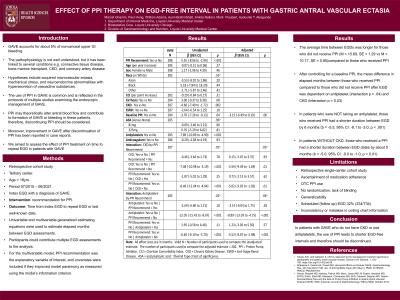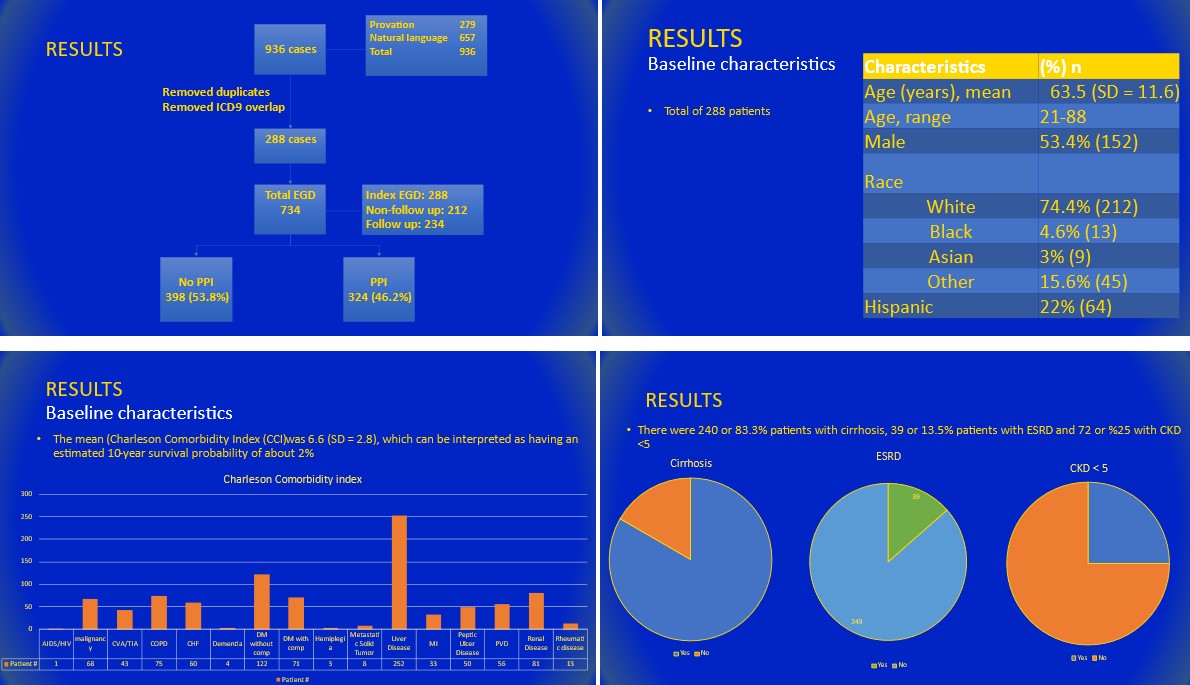Tuesday Poster Session
Category: Stomach
P5054 - Effect of PPI Therapy on EGD-Free Interval in Patients With Gastric Antral Vascular Ectasia
Tuesday, October 29, 2024
10:30 AM - 4:00 PM ET
Location: Exhibit Hall E

Has Audio
- AA
Ayokunle T. Abegunde, MD, MSc, MRCP, FACG
Loyola University Medical Center
Maywood, IL
Presenting Author(s)
Paul Hong, MD1, Ankita Nallani, MD1, Aumi Brahmbhatt, MD2, Mark Flaubert, MD1, William Adams, PhD3, Ayokunle T. Abegunde, MD, MSc, MRCP, FACG1
1Loyola University Medical Center, Maywood, IL; 2Loyola University Medical Center, Minneapolis, MN; 3Loyola University, Maywood, IL
Introduction: Gastric Antral Vascular Ectasia (GAVE) accounts for 5% of nonvariceal upper gastrointestinal (GI)bleeding. Anecdotal evidence suggests that the use of proton pump inhibitors (PPI) in GAVE patients may increase the risk of GI bleeding and improvement of GAVE after discontinuation of PPI has been described in case reports. However, population-level data is lacking on the long-term effect of PPI in patients with GAVE. We aimed to assess the effect of PPI treatment on time to repeat esophagogastroduodenoscopy (EGD) in patients with GAVE
Methods: Retrospective cohort study in a quaternary medical center from July 2015 to June 2021. The primary outcome was time from index EGD to repeat EGD. Univariable and multivariable generalized estimating equations were used to calculate elapsed months between EGD assessments. Participants could contribute multiple EGD assessments to the analysis. For the multivariable model, PPI recommendation was the explanatory variable of interest, and covariates were included if they improved model parsimony as measured using the model’s information criterion. All statistical analysis was performed with SAS version 9.4 (Cary, NC).
Results: In our cohort of 288 patients, 53.4% were male, mean age 63.5(11.6), the majority (74.4%) were white, and 83.3% had liver cirrhosis. The mean time between EGDs was longer for those who did not receive PPI (M = 15.69, SE = 1.29) compared to those who received PPI (M = 10.17, SE = 0.85). After controlling for a baseline PPI use, the mean difference in elapsed months between those who received PPI versus those who did not receive PPI after EGD was dependent on antiplatelet (interaction p = .04) and CKD (interaction p = .03). In patients who were NOT taking an antiplatelet, those who received PPI had a shorter duration between EGD dates by about 6 months (b = -5.5, 95% CI: -8.1 to -3.0; p < .001). In patients WITHOUT CKD, those who received a PPI had a shorter duration between EGD dates by about 5 months (b = -5.0, 95% CI: -9.0 to -1.0; p = .01)
Discussion: This study suggests that PPIs are associated with shorter EGD-free intervals in GAVE patients, particularly those who do not have CKD or do not take antiplatelet medication. Therefore, discontinuation of PPI should be considered in GAVE patients if there is no strong indication for long-term use.

Note: The table for this abstract can be viewed in the ePoster Gallery section of the ACG 2024 ePoster Site or in The American Journal of Gastroenterology's abstract supplement issue, both of which will be available starting October 27, 2024.
Disclosures:
Paul Hong, MD1, Ankita Nallani, MD1, Aumi Brahmbhatt, MD2, Mark Flaubert, MD1, William Adams, PhD3, Ayokunle T. Abegunde, MD, MSc, MRCP, FACG1. P5054 - Effect of PPI Therapy on EGD-Free Interval in Patients With Gastric Antral Vascular Ectasia, ACG 2024 Annual Scientific Meeting Abstracts. Philadelphia, PA: American College of Gastroenterology.
1Loyola University Medical Center, Maywood, IL; 2Loyola University Medical Center, Minneapolis, MN; 3Loyola University, Maywood, IL
Introduction: Gastric Antral Vascular Ectasia (GAVE) accounts for 5% of nonvariceal upper gastrointestinal (GI)bleeding. Anecdotal evidence suggests that the use of proton pump inhibitors (PPI) in GAVE patients may increase the risk of GI bleeding and improvement of GAVE after discontinuation of PPI has been described in case reports. However, population-level data is lacking on the long-term effect of PPI in patients with GAVE. We aimed to assess the effect of PPI treatment on time to repeat esophagogastroduodenoscopy (EGD) in patients with GAVE
Methods: Retrospective cohort study in a quaternary medical center from July 2015 to June 2021. The primary outcome was time from index EGD to repeat EGD. Univariable and multivariable generalized estimating equations were used to calculate elapsed months between EGD assessments. Participants could contribute multiple EGD assessments to the analysis. For the multivariable model, PPI recommendation was the explanatory variable of interest, and covariates were included if they improved model parsimony as measured using the model’s information criterion. All statistical analysis was performed with SAS version 9.4 (Cary, NC).
Results: In our cohort of 288 patients, 53.4% were male, mean age 63.5(11.6), the majority (74.4%) were white, and 83.3% had liver cirrhosis. The mean time between EGDs was longer for those who did not receive PPI (M = 15.69, SE = 1.29) compared to those who received PPI (M = 10.17, SE = 0.85). After controlling for a baseline PPI use, the mean difference in elapsed months between those who received PPI versus those who did not receive PPI after EGD was dependent on antiplatelet (interaction p = .04) and CKD (interaction p = .03). In patients who were NOT taking an antiplatelet, those who received PPI had a shorter duration between EGD dates by about 6 months (b = -5.5, 95% CI: -8.1 to -3.0; p < .001). In patients WITHOUT CKD, those who received a PPI had a shorter duration between EGD dates by about 5 months (b = -5.0, 95% CI: -9.0 to -1.0; p = .01)
Discussion: This study suggests that PPIs are associated with shorter EGD-free intervals in GAVE patients, particularly those who do not have CKD or do not take antiplatelet medication. Therefore, discontinuation of PPI should be considered in GAVE patients if there is no strong indication for long-term use.

Figure: Results
Note: The table for this abstract can be viewed in the ePoster Gallery section of the ACG 2024 ePoster Site or in The American Journal of Gastroenterology's abstract supplement issue, both of which will be available starting October 27, 2024.
Disclosures:
Paul Hong indicated no relevant financial relationships.
Ankita Nallani indicated no relevant financial relationships.
Aumi Brahmbhatt indicated no relevant financial relationships.
Mark Flaubert indicated no relevant financial relationships.
William Adams indicated no relevant financial relationships.
Ayokunle Abegunde: Ferring Pharmaceuticals – Consultant. Ferring Pharmaceuticals – Consultant.
Paul Hong, MD1, Ankita Nallani, MD1, Aumi Brahmbhatt, MD2, Mark Flaubert, MD1, William Adams, PhD3, Ayokunle T. Abegunde, MD, MSc, MRCP, FACG1. P5054 - Effect of PPI Therapy on EGD-Free Interval in Patients With Gastric Antral Vascular Ectasia, ACG 2024 Annual Scientific Meeting Abstracts. Philadelphia, PA: American College of Gastroenterology.
